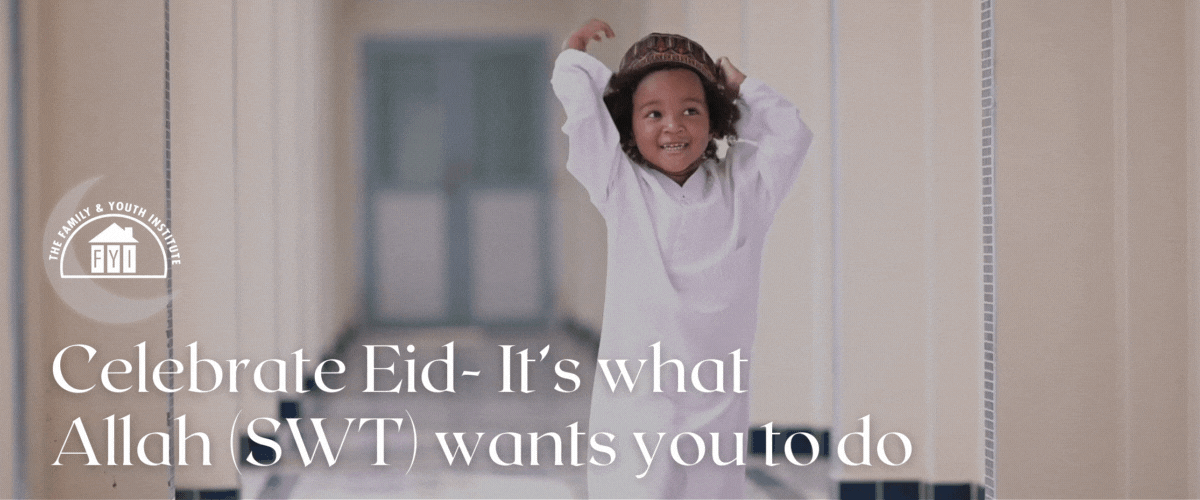
This article is authored by Sameera Ahmed, Ph.D.
Holidays may seem as simple as a day to have fun and celebrate. But, they are far more important to our well-being and identity— and work to build resilience in all of us. Celebrating Eid is no different. If humans have shown one trait through this pandemic, it’s resilience. Day by day, we are making it through some tough times, and celebrating Eid is just one example of that. In this article, we’ll discuss the true meaning and impact of celebrating Eid, within a pandemic or not.
Celebrating resilience
Eid is not just a Muslim holiday at the end of Ramadan. It’s a celebration of resilience— of the completion of struggling and pushing through 30 days of fasting and increased worship. Celebrations meet an internal need for emotional and social nourishment. Similar to how plants need nourishment, our souls also need nourishment. If we don’t intentionally and actively celebrate, we start to lose enthusiasm and motivation and burn out quickly. By celebrating, we are giving our mental health a boost by focusing on small positive gains— particularly in a time when many feel overwhelmed.Celebrating Eid is also an expression of gratitude to Allah (SWT)
By celebrating our accomplishment, we show Him that we are grateful for allowing us to experience and complete Ramadan. We show him appreciation for what He provided us to get through this month:“And (He desires) that you should complete the prescribed period and that you should glorify Allah for having guided you and that you may give thanks.”
(Al-Baqarah 2:185)
Celebrating our identity and values
Although resilience is often thought of as being able to bounce back from challenges, it can also be thought of as trying to keep up your regular routines even when it’s hard. When you make it through tough times, you reinforce the message that you are resilient, and celebrating Eid does just that. By focusing on building rituals and traditions, you honor your heritage and help define yourself as an individual and as a family. Maintaining rituals highlights what is important for you to hold onto even in times of adversity.
This is no truer than now, living in America. Research shows that children who value their Muslim identity as highly as they do their American identity have greater positive outcomes. It’s imperative to build positive associations so that they continue to value Muslim traditions and holidays. When children see you valuing certain family rituals, they remember and hold onto their family identity and religious values. So how can you do this?
Although resilience is often thought of as being able to bounce back from challenges, it can also be thought of as trying to keep up your regular routines even when it’s hard. When you make it through tough times, you reinforce the message that you are resilient, and celebrating Eid does just that. By focusing on building rituals and traditions, you honor your heritage and help define yourself as an individual and as a family. Maintaining rituals highlights what is important for you to hold onto even in times of adversity.
This is no truer than now, living in America. Research shows that children who value their Muslim identity as highly as they do their American identity have greater positive outcomes. It’s imperative to build positive associations so that they continue to value Muslim traditions and holidays. When children see you valuing certain family rituals, they remember and hold onto their family identity and religious values. So how can you do this?
Think about the values you want to highlight.
Involve the family by having a meeting to discuss reframing this Eid as an opportunity to celebrate resilience. Brainstorm ideas about what would make this Eid uniquely special for your family.
-
- • Don’t make it about money. For some of us, financial hardship may impact our gift-giving. Use this chance to reflect on the patterns of consumerism we may have gotten used to, which may make us miss out on the true meaning of generosity and the giving tradition that runs deep within our religion. How we choose to celebrate, highlights our true values and sends messages to our children for what to expect out of this holiday.
- • With older kids, use this as an opportunity to talk about current unemployment levels in America and how many are struggling. Make Islam relevant for your tweens and teens.
- • Don’t make it about money. For some of us, financial hardship may impact our gift-giving. Use this chance to reflect on the patterns of consumerism we may have gotten used to, which may make us miss out on the true meaning of generosity and the giving tradition that runs deep within our religion. How we choose to celebrate, highlights our true values and sends messages to our children for what to expect out of this holiday.
-
- • Let go of what causes you stress. You may feel pressured to have a decorated house and hold a burdensome gathering, but if it’s causing you stress and making you grumpy, is that really building positive associations around Eid? Perhaps it’s time to refocus your priorities on what truly makes you happy.
Involve the family by having a meeting to discuss reframing this Eid as an opportunity to celebrate resilience. Brainstorm ideas about what would make this Eid uniquely special for your family.
- • Pre-Eid Celebrations
- • Decorate the house- visuals are great to link our memories with positive feelings
- • Get together the night before Eid to do henna or prep for Eid
- • Don’t lose the spiritual opportunity of this night:
The Messenger of Allah (PBUH) said, ’There are five nights on which du’a is not rejected: the first night of Rajab, the fifteenth night of Sha’ban, Thursday night, the night before Eid al-Fitr and the night before Eid al-Nahr (al-Adha)’.
[Suyuti]
[Suyuti]
- • The Sunnahs of Eid
-
- • Engage in the sunnahs of Eid: ghusl on Eid day, eating before eid prayer, dressing up, reciting takbeerat (praises to Allah (SWT)), exchanging well wishes, prayers, and eating and drinking festive foods during daylight hours!
- • Even if you don’t feel up for it, try to make this a special occasion in what you wear and do, as the Prophet (PBUH) did. Celebrate the spiritual renewal, self-discipline, and a more beautified state of being you experienced in Ramadan.
- • If you are not able to pray with your community, you can still gather with family or loved ones in your prayer space to make takbeerat and pray Eid Salat together.
- • Connect with Community
-
- • Collective celebration is important and helps solidify the feeling that we are all in this together. Finding ways to celebrate together can also remind us that we are part of a larger community that cares for us and we care for.
- • As you plan on how you will personally celebrate, make sure to try to include others who may be forgotten and left out, such as:
- • Unmarried brothers/ sisters without loved ones nearby and would love to be included in a collective celebration.
- • Converts who might not have a close family to celebrate with and would love an invitation to your gathering.
- • Some may have lost jobs this year and finances might be an issue – having a meal dropped off or being given a gift card might come as such a relief as we try to find a way to make the day special for our families.
- • Some may even have had COVID-19 related illnesses or deaths in our family— having someone remember us and reaching out on this special day of the year may mean the world to us.
We’ve brainstormed some activities below to try but for a comprehensive list, refer to this article.
Connect with your Family and Friends
- • Drive by Eid celebration
- • Online gatherings
- • Secret Sahabi (secret gift exchanges)
- • Socially distant picnics
- • Online gaming
Family Activities
- • “Yes Day”
- • Gift exchange
- • Take a Hike
- • Visit the sick.
- • Family Backyard Olympics
- • Scavenger hunt
- • Food decorations
- • Ice cream sundaes
- • Board games
- • Campfire
Remember, celebrating Eid is about celebrating our resilience through this month during unique times. It’s about celebrating our values and traditions so that we know what we hold dear and what we’d like to pass on to generations. It’s about coming together as a collective Ummah! May Allah accept all of our ibadat (worship) this month. From our family to yours, The Family and Youth Institute would like to wish you a blessed and Happy Eid!
Celebrate Eid- It’s what Allah (SWT) wants you to do
